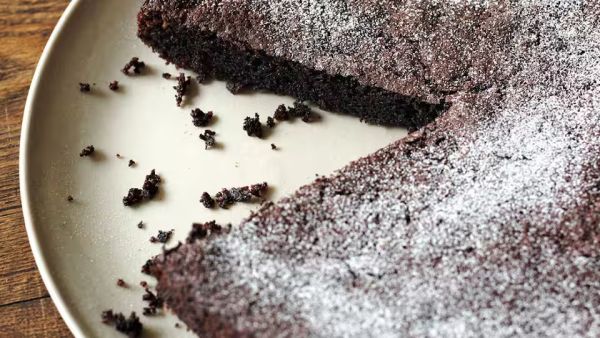Chocolate olive oil cake
cake
dessert
Ingredients
- 150 ml (5 fl oz) regular olive oil, plus extra for greasing
- 50 g (2 oz) cocoa powder, sifted
- 125 ml (4 fl oz) boiling water
- 2 tsp vanilla extract
- 150 g (5½ oz) almond meal (ground almonds) or 125 g (4½ oz) plain flour
- ½ tsp bicarbonate of soda
- pinch of salt
- 200 g (7 oz) caster sugar
- 3 free-range eggs
Directions
- Preheat the oven to 170°C. Grease a 23 cm (9 in) springform cake tin with a little oil and line the base with baking paper.
- Measure and sift the cocoa powder into a bowl or jug and whisk in the boiling water until you have a smooth, chocolatey, still runny (but only just) paste. Whisk in the vanilla extract, then set aside to cool a little.
- In another smallish bowl, combine the almond meal (or flour) with the bicarbonate of soda and a pinch of salt.
- Put the sugar, olive oil and eggs into the bowl of a freestanding mixer with the paddle attachment (or other bowl and whisk arrangement of your choice) and beat together vigorously for about 3 minutes until you have a pale-primrose, aerated and thickened cream.
- Turn the speed down a little and pour in the cocoa mixture, beating as you go, and when all is scraped in you can slowly tip in the almond (or flour) mixture.
- Scrape down and stir a little with a spatula, then pour this dark, liquid batter into the prepared tin. Bake for 40–45 minutes or until the sides are set and the very centre, on top, still looks slightly damp. A cake tester should come up mainly clean but with a few sticky chocolate crumbs clinging to it.
- Let it cool for 10 minutes on a wire rack, still in its tin, and then ease the sides of the cake with a small metal spatula and spring it out of the tin. Leave to cool completely or eat while still warm with some ice-cream, as a pudding.
Note
- It is slightly heavier with the almonds – though not in a bad way – so if you want a lighter crumb, rather than a squidgy interior, and are not making the cake for the gluten-intolerant, then replace the 150 g almond meal with 125 g plain flour. This has the built-in bonus of making it perhaps more suitable for an everyday cake.
